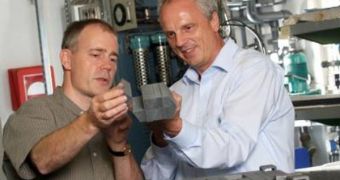Experts from the Fraunhofer Institute for Ceramic Technologies and Systems IKTS, in Dresden, Germany, have just created a new type of particle filter that is circle-shaped. Although this may not seem like much, their creation will help vehicle users save a lot of money when they will install particle filters on their automobiles, trucks, buses, fork-lifts, and so on. Until now, only square filters were available, and they had to be rounded up by cutting them with a diamond-head drill, a procedure that is fairly expensive. Now, it will become a thing of the past.
The German innovation addresses off-road vehicles such as diggers and fork-lift trucks, as well as city buses and garbage trucks. These vehicles will have to comply with the new European Union (EU) norms on pollution from 2011, which state that all of them will need to have particle filters installed. The aim is to cut back on greenhouse gas emissions within the Union by up to 95 percent. However, at this point, the only available option is to take a square filter, which can be found in average cars, and chopping it to pieces with a diamond cutter, until the desired shape is obtained.
Now, thanks to the work of Joerg Adler and Dr. Reinhard Lenk, both experts at the German Fraunhofer Institute, that issue may have been resolved. Using a proprietary IKTS porous silicon carbide ceramic material, the team managed to develop a highly efficient ceramic diesel particle filter, to be used predominantly by heavy vehicles such as those enumerated above. Their work has brought them the 009 Joseph von Fraunhofer prize, which they will receive soon.
In a particle filter, the size, distribution and volume of its pores are essential to its performance. When starting anew with their construction, the two scientists had no idea what shape suited their new filter best. “We agonized over the basic shape of the filter segments,” Adler said. Working together with colleagues from the HUSS Umwelttechnik GmbH, the experts were finally able to come up with an appropriate shape, and also to develop a method of mass-producing the device, so as to lower its retail costs, and make them affordable for drivers.
“We have also thought about the series at all stages of the development and defined the conditions for it with our partner. Some of the CDC staff members were initially directly involved in the project work at the institute, in order to simplify the transfer to production,” Lenk said. Clean Diesel Ceramics (CDC) GmbH is a subsidiary of HUSS, created back in 2008, with the purpose of producing the ceramic fibers needed for the new filters.

 14 DAY TRIAL //
14 DAY TRIAL //